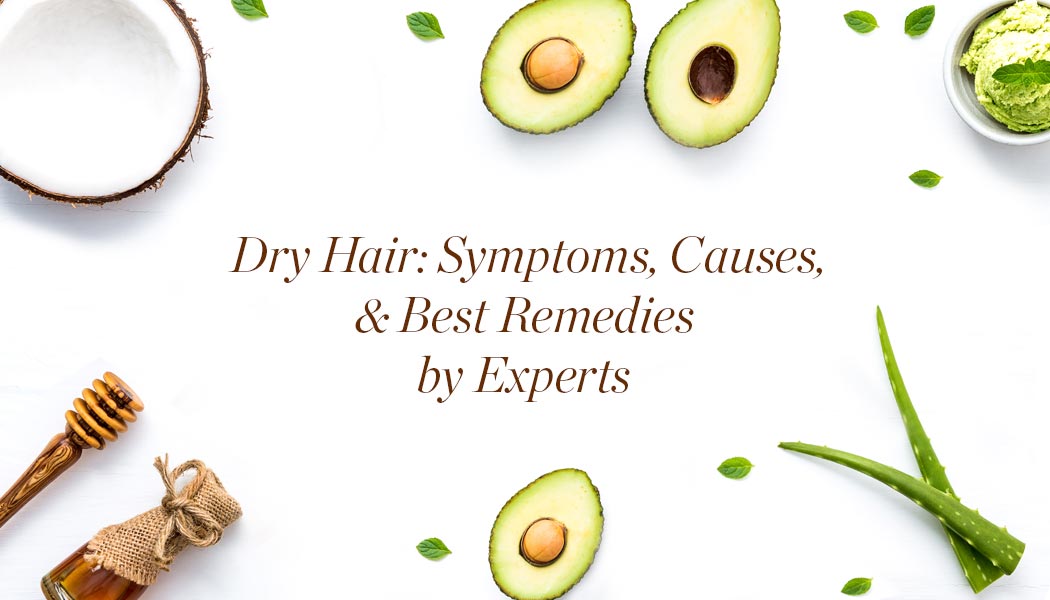Are you tired of battling with dry hair that seems to have lost its luster? Get ready to discover natural remedies, expert tips, and transformative hair care routines that will leave you with beautifully nourished and irresistibly shiny hair.
In this article, we delve into the world of dry hair, exploring its causes, symptoms, and most importantly, effective solutions inspired by the ancient wisdom of Ayurveda
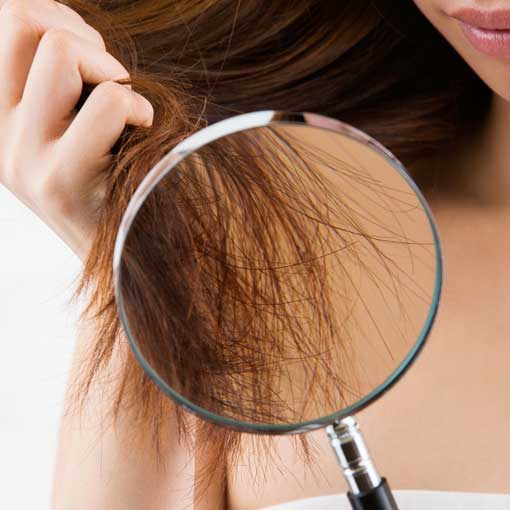
What Causes Dry Hair?
Various factors, including genetics, environmental conditions, overwashing, heat styling, chemical treatments, improper hair care, nutritional deficiencies, and certain medical conditions, can cause dry hair. Let’s talk about them briefly.
- Natural hair type: Some individuals have naturally drier hair due to genetics, especially with curly or coily hair types.
- Environmental factors: Exposure to sun, wind, dry air, chlorine, or saltwater can strip moisture from the hair.
- Overwashing: Frequent washing with harsh shampoos can remove natural oils and lead to dryness.
- Heat styling: Excessive use of hair dryers, curling irons, and straighteners can deplete moisture from the hair.
- Chemical treatments: Perming, relaxing, and coloring can strip moisture and damage the hair.
- Improper hair care: Using the wrong products or neglecting regular conditioning can contribute to dryness.
- Nutritional deficiencies: Lack of essential nutrients like vitamins A, C, E, B vitamins, and minerals can affect hair health.
- Medical conditions and age: Hypothyroidism, hormonal imbalances, scalp psoriasis, or eczema can cause dryness.
What Ayurvedic Experts Say -
"Dry hair is often caused by an imbalance in the Vata dosha, which leads to a lack of natural oil production in the scalp. This can be aggravated by excessive heat, environmental factors, and improper hair care routines."
Dr. Kanchan Kachroo
Does Dry Scalp Cause Dry Hair?
Yes, dry scalp can contribute to dry hair. The scalp produces natural oils that help moisturize the hair. Dry scalp disrupts the balance of moisture and oil, making the hair more prone to dryness, brittleness, and lack of shine.
Dry scalp also impacts our hair cuticles. The cuticle is the outermost layer of the hair shaft and consists of overlapping scales.When the cuticle is healthy and intact, it helps to seal in moisture and protect the inner layers of the hair.
However, when the scalp is dry, it can lead to the cuticle becoming dry and brittle as well. Dry cuticles tend to lift and separate, leaving the inner layers of the hair exposed to environmental factors and moisture loss.
What Ayurvedic Experts Say -
“Avoid harsh chemical-based hair products and opt for gentle, natural alternatives in Ayurvedic formulations. Look for ingredients like Hibiscus, Coconut milk, and Fenugreek, which provide deep conditioning and hydration to dry hair.”
Dr. Kanchan Kachroo
Signs and Symptoms Of Dry Hair
When you run your fingers through dry hair, you may feel a lack of natural lubrication or smoothness. The hair strands may appear brittle, prone to split ends, and lack flexibility. Here are some other top symptoms of dry hair.
- Absorbs water like a sponge instead of repelling it.
- Rough texture and prone to breakage.
- Difficulty in holding a hairstyle or color may indicate dryness.
- In some cases, dry hair can lead to dandruff.
- More prone to frizz and split ends.
- Lacks shine and appears dull, lifeless.
- More likely to tangle and form knots.
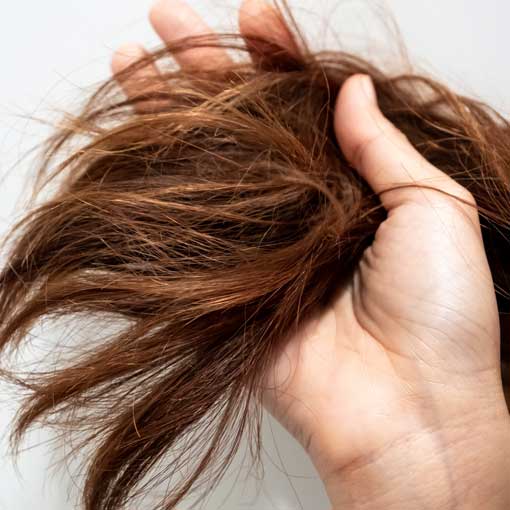
How To Treat Dry Hair?
To treat dry hair, the following can help:
- Regular scalp massage
- Hot oil treatments
- Herbal hair masks
- Minimizing heat styling
- Maintaining a balanced diet
- Staying hydrated
- Using gentle hair care products
- Protecting from environmental factors
- Managing stress.
- Washing hair less often
In the following sections, we will cover some of these remedies in detail.
Hot Oil Therapy
Hot oil treatments are a fantastic way to give your hair some much-needed moisture and care. Oils like Coconut, Olive, Almond, Jojoba, and Argan are great choices for their hydrating and conditioning properties.
These oils, rich in vitamin E and antioxidants, effectively seal the hair's outer layer, providing moisture and repairing damage. They also penetrate the hair shaft, restore moisture, improve elasticity, and enhance overall hair health and shine.
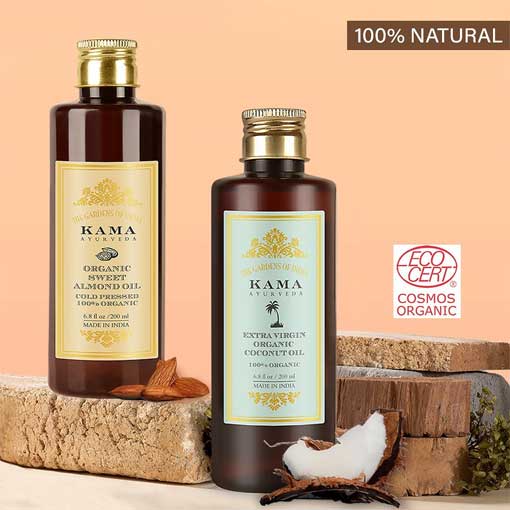
Simply warm up the oil of your choice, massage it onto your scalp and hair, and let it sit for at least 30 minutes (or overnight for an extra boost). Afterward, rinse it out and enjoy the nourishing results.
Make it a regular part of your routine, whether weekly or as needed, and your hair will thank you with improved shine and vitality.
What Ayurvedic Experts Say -
"In Ayurveda, dry hair is often seen as a result of an imbalance in the Vata dosha. Nourishing the scalp and hair with warm oil treatments and incorporating hydrating herbs like Aloe vera as hair masks can help restore moisture and vitality to dry hair."
Dr. Kanchan Kachroo
Hair Mask Treatments
Hair masks made from natural ingredients are like a secret superpower for bringing dry hair back to life, giving it the deep hydration it craves and bringing back its bounce and vitality.
Here are few of the most effective treatments -
1. Egg and Mayonnaise Hair Mask
The protein-packed eggs and nourishing mayonnaise team up to provide deep hydration and moisture to dry hair, leaving it soft, smooth, and rejuvenated.
To reap the benefits of this hair mask, beat an egg and mix it with two tablespoons of mayonnaise. Apply the mixture to damp hair, making sure to cover all strands. Leave it on for 30 minutes, then rinse thoroughly.
2. Avocado Mask
Avocado's healthy fats and vitamins deeply moisturize and strengthen the hair, giving it a luscious and vibrant appearance.
To make this hair mask, mash a ripe avocado and mix it with a tablespoon of honey. Apply the mixture to damp hair, leave it on for 30 minutes, and rinse thoroughly.
3. Banana and Honey Mask
Bananas are packed with vitamins and minerals that hydrate and soften dry hair, while honey provides additional moisture and a natural shine.
Simply mash a ripe banana and add a tablespoon of honey and a few drops of almond oil. Apply the mask to your hair, leave it on for 20-30 minutes, and rinse well.
4. Coconut Oil and Honey Mask
The combination of Coconut oil's deep hydration and honey's moisturizing and shine-enhancing effects makes this mask a powerful remedy for dry hair, restoring its health and vibrancy.
Mix equal parts of Coconut oil and Honey. Then, apply the mixture to your hair and leave it on for 30 minutes before rinsing.
5. Aloe Vera Gel Mask
Aloe vera's soothing and moisturizing properties work wonders on dry and damaged hair, leaving it feeling soft, hydrated, and revitalized.
Simply extract the gel from an Aloe Vera leaf and apply it directly to the hair. Leave it on for 30 minutes, then rinse thoroughly.
6. Yogurt and Egg Mask
Protein-rich yogurt and eggs help nourish the hair, improving its moisture balance and promoting healthier, more manageable strands.
Making and applying this hair mask is very easy.Beat an egg and mix it with half a cup of plain yogurt. Apply the mixture to damp hair, leave it on for 20 minutes, and rinse with cool water.
Pro Tip: Apply natural hair masks evenly from roots to ends, massage into the scalp, cover with a shower cap, and rinse thoroughly for hydrated and nourished hair.
A Balanced Nutrition Rich Diet
Start by incorporating foods that are rich in omega-3 fatty acids, such as fatty fish like salmon, chia seeds, and walnuts. These essential fatty acids help nourish the hair follicles and promote healthy hair growth.
Don't forget to include a variety of fruits and vegetables in your diet, as they provide essential vitamins and minerals. Look for foods like spinach, kale, carrots, and berries that are packed with antioxidants, which help protect the hair from oxidative stress and damage.
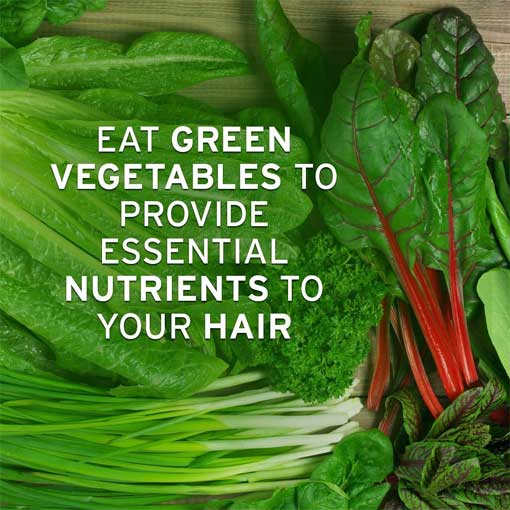
Protein is also crucial for healthy hair, so be sure to include lean sources like chicken, eggs, and legumes in your meals. Protein helps strengthen the hair shaft and prevent breakage, promoting stronger and more resilient hair.
Additionally, stay hydrated by drinking an adequate amount of water throughout the day. Hydration is key for maintaining the moisture balance of both your body and your hair.
Incorporate Gentle Hair Care
First and foremost, choose a mild and moisturizing shampoo specifically formulated for dry hair. Look for products that are sulfate-free and enriched with natural ingredients. These gentle cleansers will cleanse your hair without stripping away its natural oils, leaving it clean and hydrated.
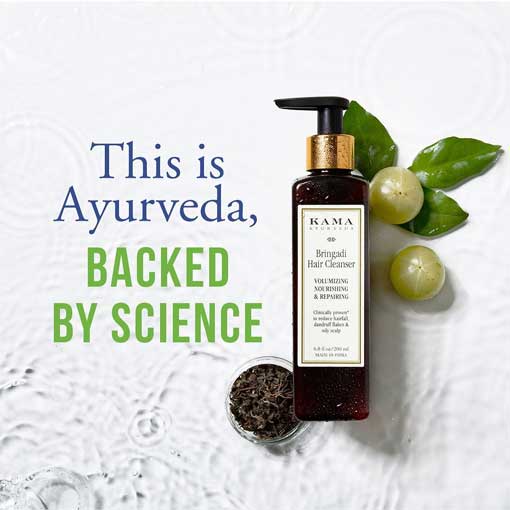
Now for the next step, conditioning is essential for dry hair, so invest in a rich and hydrating conditioner. Apply it generously to the lengths and ends of your hair, allowing it to penetrate and moisturize deeply. Consider using a wide-toothed comb to distribute the conditioner evenly and minimize breakage.
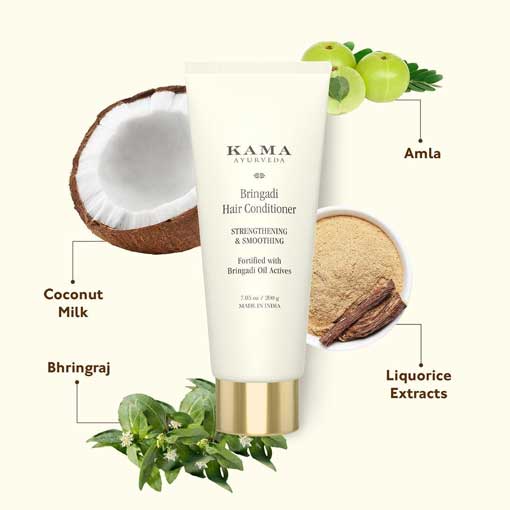
And lastly, incorporate regular deep conditioning treatments into your routine. These treatments can be in the form of hair masks or natural oil treatments. Apply a generous amount to damp hair, cover it with a shower cap or towel, and let the treatment work its magic for at least 30 minutes before rinsing thoroughly.

Infrequent Hair Wash
By reducing the frequency of hair washing, you allow the natural oils produced by your scalp, known as sebum, to distribute and moisturize the hair strands. This helps in retaining essential moisture, promoting overall hair health.
However, it's important to find the right balance, as excessively long intervals between washes can lead to scalp issues like oil buildup or dandruff.
If you're used to washing your hair daily, try skipping a day and observe how your hair responds. You may find that your hair becomes less greasy over time as your scalp adjusts to the new routine.
Read - How Often To Wash Hair? – Expert Advice
Essential Oils For Dry Hair
Essential oils have long been cherished for their remarkable properties in addressing dry hair concerns. These concentrated plant extracts offer a natural and effective way to nourish, moisturize, and revitalize dry locks.
For instance, Lavender oil, with its calming scent, moisturizes the scalp and reduces itchiness. Ylang Ylang oil, with its delightful floral aroma, restores luster to dry, brittle hair while balancing scalp oil production.
To use essential oils, dilute a few drops in a carrier oil like Coconut or Almond oil, and massage it into the scalp and hair. Alternatively, add a few drops to your shampoo or conditioner for added moisture and fragrance.
Read - 12 Best Essential Oils For Hair That Work Wonders
Tips To Avoid Dry Hair
1. Protect From Environmental Damage
Exposure to various environmental factors such as sunlight, pollution, and harsh weather conditions can leave your hair dry, dull, and prone to damage. When spending time outdoors, especially during intense sun exposure, wear a hat to provide shade and protect your hair from harmful UV rays.
2. Limit Heat Styling
Excessive use of heat styling tools like flat irons, curling irons, and blow dryers can strip away moisture from your hair. Minimize heat styling and always use a heat protectant spray before using any hot tools.
3. Take Cold Showers
Hot water can strip away natural oils from your hair, leaving it dry and brittle. Opt for cooler water temperatures while washing your hair to help retain moisture.
4. Avoid Salt Water
Saltwater from oceans or swimming pools can be drying to your hair. Rinse your hair thoroughly with fresh water after swimming in saltwater, and consider using a protective leave-in conditioner to minimize the drying effects.
5. Avoid Chemical Hair Dyes
Harsh chemical hair dyes can contribute to dryness and damage. If you color your hair, choose ammonia-free or natural alternatives like Henna and Indigo powder that are gentler on the hair shaft and less likely to cause dryness.
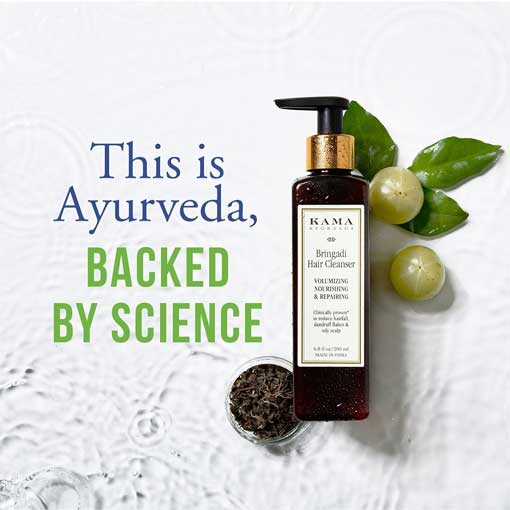
6. Avoid Towel Drying
We also recommend that you avoid vigorous towel drying, as this can roughen up the hair cuticles and contribute to frizz and breakage. Instead, gently squeeze out excess water and wrap your hair in a soft, microfiber towel or an old cotton t-shirt to absorb moisture without causing friction.
7. Manage Stress
Stress disrupts the natural oil production in hair, leading to dryness. To prevent stress-related dry hair, prioritize stress management techniques like relaxation exercises, exercise, sleep, and seeking support. Maintain a healthy lifestyle, practice self-care, and follow a balanced diet to reduce stress levels and promote healthier hair.
End Note
Whether it's nourishing hair masks, essential oils, or lifestyle changes, there are various remedies available to restore moisture and vitality to your locks. By embracing a holistic approach that includes proper nutrition, gentle hair care practices, and stress management, you can transform your dry hair into a luscious, healthy mane.
